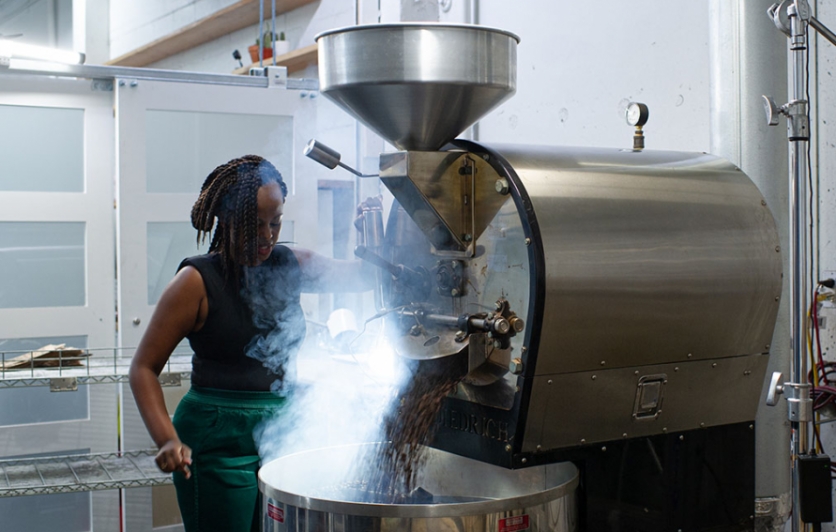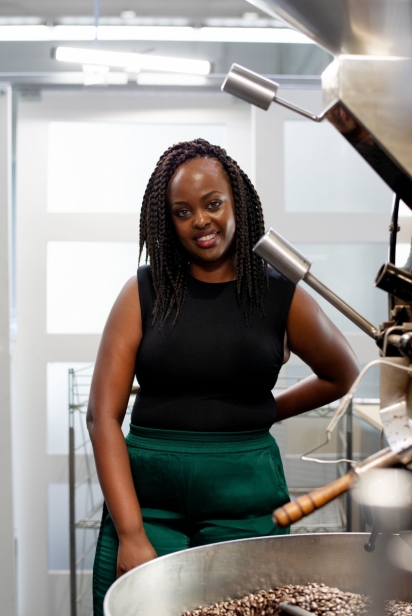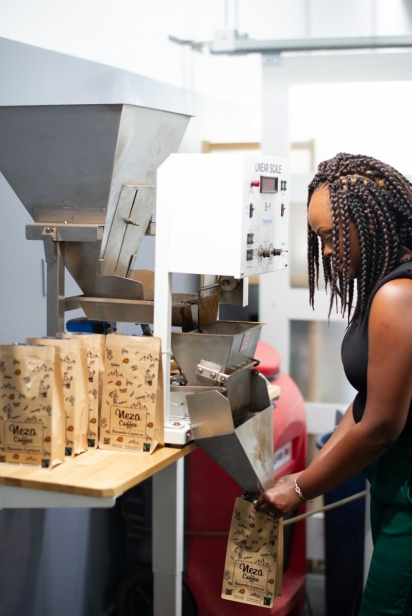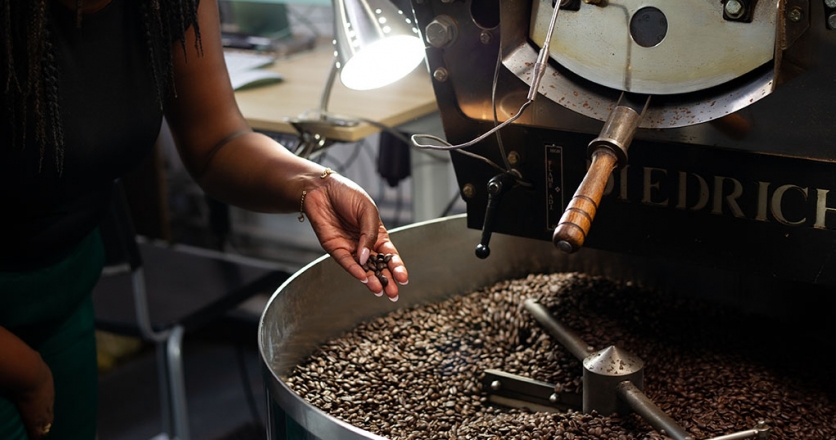Coffee with a Cause
Nadine Umutoni was a child when her world was forever altered by the genocide of Tutsis in Rwanda. Now she’s helping survivors access mental health services one bag of coffee at a time.
Before she was eight years old, Nadine Umutoni lived an innocent life in the suburbs of Rwanda’s capital city, Kigali. She was one of nine siblings and describes her mother as a godmother-like figure to many of the Tutsi and Hutu children in the neighbourhood. She spent much of her time at her grandmother’s, who was a coffee farmer and main breadwinner in the family.
Then on April 7, 1994, Umutoni’s world changed forever as the country erupted in civil war between the Hutus and Tutsis, which led to the genocide of an estimated 800,000 (some estimates say more) Tutsis in a matter of 100 days.
Days before the genocide began, Umutoni’s mother brought her to a Hutu neighbour, asking them to hide her daughter. That was the last time she saw her mother.
“I knew I was Tutsi, but I did not know that it was a crime to be Tutsi at the time,” Umutoni says. The conflict between majority Hutus and minority Tutsis had been broiling for years leading up to the 1994 events. The president of Rwanda and the president of neighbouring Burundi — both Hutus — were coming back to Kigali by plane after brokering a power-sharing deal with a Tutsi rebel group called the Rwanda Patriotic Front (RPF) when a missile shot the plane down.
It was believed that RPF was responsible for the assassination. However, no conclusion has ever been made and the case was dismissed by a French judge in 2020. Hutu nationalists and local official encouraged the majority Hutus to take up arms against their neighbours. The genocide was swift and brutal and only ended when the RPF gained control of the capital.
After the genocide, many Hutus also fled the country and it is estimated that the conflict displaced two million people in a country of six million at the time.
The woman who was charged with Umutoni’s care explained what was happening to prepare her for the road ahead. The plan was to flee Rwanda to neighbouring Democratic Republic of Congo on foot.
Umutoni recalls walking for a month with her pregnant neighbour until they made it to a refugee camp in the DRC. At the camp, an NGO worked to reunite families. Umutoni was fortunate to have been located and on August 18, 1994, just over a month after the genocide ended, she returned to Rwanda to join her father and three sisters. Her mother, grandmother, three of her sisters and two of her brothers had all been killed in the genocide.
“Life was never the same,” Umutoni says. “I was no longer a child. I went from being eight to being 25 years old.”
A new life in Canada
When Umutoni was 20, she was sent to Canada by her family as a refugee.
“At the time, the genocide was over, but we weren't 100 per cent sure about the future of the country, so whoever had the chance to get out of the country did leave,” Umutoni says.
She landed in Ottawa not knowing the language or what life would hold for her in Canada. She moved to Vancouver and began to study finance at the British Columbia Institute of Technology, soon realizing that the finance industry was not for her. She left the program and found gainful employment in the film industry. Then, the COVID-19 pandemic hit.
“It was a time to reset and think about what I have put aside that is meaningful to me,” Umutoni says. “I have always had it in the back of my mind that one day I was going to start a coffee company and use beans grown by friends and family. I know first-hand how hard they work to grow coffee and how much they love it.”
As a result, Umutoni is able to source single origin Rwandan beans directly from farmers, cutting out expensive middlemen, while providing customers with a premium product.
“The coffee is smooth and has floral and fruity flavours,” Umutoni says. “It doesn’t need a lot of cream and for some people that takes a moment to get used to, but I’m getting really good feedback.”
Rwanda is largely an agrarian country. According to the World Bank, employment in agriculture accounts for 62 per cent of occupations in Rwanda and employs 71 per cent of Rwanda’s working female population and 51 per cent of the male working population. Its most known commodities are coffee and tea.
When it came time to name the company, Umutoni thought about the role the beans have played in her life and decided to call it Neza, which means "greatness” in her language.
“Coffee put food on the table and I was able to go to school at some point because my grandma or my family were able to pay for it with the coffee they grew," Umutoni says. "It fit the vision I have for my company."
A legacy of trauma
Umutoni’s vision for Neza is bigger than beans in bags. She’s integrated a social enterprise component by donating 10 per cent of proceeds to Groupe des Ancients Etudiants Rescapees du Genocide (GAERG), an organization that helped her when she was growing up.
“I have always wanted to find a way to help my community because of the trauma we went through,” Umutoni says. “It has made a lot of damage and now, [nearly] 27 years later, we need help. We're starting to create our families and I see so much trauma being passed on to the next generation.”
By some, Rwanda is seen as a progressive country in Africa for its stance on health care and mental health services. After the genocide, the goverment placed a priority on mental health services and launched programs designed to help communities heal from trauma and create social cohesion. However, much like in Canada, therapy is not always accessible to those without extended health care.
“The other thing that we've realized from a cultural standpoint is that many people are not comfortable going to a traditional therapist,” Umutoni says. “It’s not something that we grew up with — to sit in front of someone or a group of people and talk.”
Umutoni has had her own journey reconciling what happened in 1994.
“After the genocide, we were all in survival mode. Our houses were destroyed, we were trying to reunite with our families and figure out where we were going to eat,” Umutoni says. “The next month, I was back in school and we never had time to sit down and realize what just happened.”
Now, Umutoni, who is 36 years old, is gaining some perspective as her peers have children and nieces and nephews are nearing the age she was when she fled Rwanda.
“I look at them and I don’t see how a young person goes through that.”
Not only had she lost many members of her family but she also lost her home. Her family home was levelled and the remaining family members relocated to a different area, but the property remains in the family.
“The thing is, it is in the area where our neighbours killed my family,” Umutoni says. “[Building on the property] would be symbolic to show them that they tried, but did not succeed. We have survived and we are going to rebuild our family here.”
“Maybe my kids and my grandkids will go back there to live – I don't know. Just to be there, because we have had great memories there also. It is hard, but I think having something there would be a healing moment for me.”
While this article was being written, Umutoni had plans to fly back to Rwanda to present the (GAERG) with her first donation.
Neza Coffee
nezacoffee.com | 604.781.6922 | @nezacoffee










